12 start with I start with I
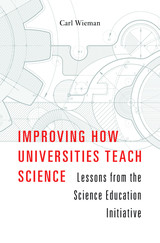
Too many universities remain wedded to outmoded ways of teaching science in spite of extensive research showing that there are much more effective methods. Too few departments ask whether what happens in their lecture halls is effective at helping students to learn and how they can encourage their faculty to teach better. But real change is possible, and Carl Wieman shows us how it can be brought about.
Improving How Universities Teach Science draws on Wieman’s unparalleled experience to provide a blueprint for educators seeking sustainable improvements in science teaching. Wieman created the Science Education Initiative (SEI), a program implemented across thirteen science departments at the universities of Colorado and British Columbia, to support the widespread adoption of the best research-based approaches to science teaching. The program’s data show that in the most successful departments 90 percent of faculty adopted better methods. Wieman identifies what factors helped and hindered the adoption of good teaching methods. He also gives detailed, effective, and tested strategies for departments and institutions to measure and improve the quality of their teaching while limiting the demands on faculty time.
Among all of the commentary addressing shortcomings in higher education, Wieman’s lessons on improving teaching and learning stand out. His analysis and solutions are not limited to just one lecture hall or course but deal with changing entire departments and universities. For those who want to improve how universities teach science to the next generation, Wieman’s work is a critical first step.
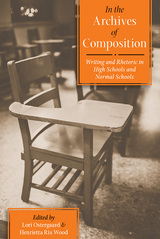


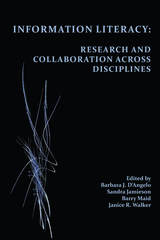
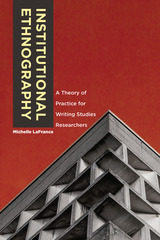
In this book, Michelle LaFrance introduces the theories, rhetorical frames, and methods that ground and animate institutional ethnography. Three case studies illustrate key aspects of the methodology in action, tracing the work of writing assignment design in a linked gateway course, the ways annual reviews coordinate the work of faculty and writing center administrators and staff, and how the key term “information literacy” socially organizes teaching in a first-year English program. Through these explorations of the practice of ethnography within sites of writing and writing instruction, LaFrance shows that IE is a methodology keenly attuned to the material relations and conditions of work in twenty-first-century writing studies contexts, ideal for both practiced and novice ethnographers who seek to understand the actualities of social organization and lived experience in the sites they study.
Institutional Ethnography expands the field’s repertoire of research methodologies and offers the grounding necessary for work with the IE framework. It will be invaluable to writing researchers and students and scholars of writing studies across the spectrum—composition and rhetoric, literacy studies, and education—as well as those working in fields such as sociology and cultural studies.
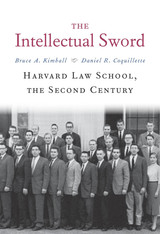
A history of Harvard Law School in the twentieth century, focusing on the school’s precipitous decline prior to 1945 and its dramatic postwar resurgence amid national crises and internal discord.
By the late nineteenth century, Harvard Law School had transformed legal education and become the preeminent professional school in the nation. But in the early 1900s, HLS came to the brink of financial failure and lagged its peers in scholarly innovation. It also honed an aggressive intellectual culture famously described by Learned Hand: “In the universe of truth, they lived by the sword. They asked no quarter of absolutes, and they gave none.” After World War II, however, HLS roared back. In this magisterial study, Bruce Kimball and Daniel Coquillette chronicle the school’s near collapse and dramatic resurgence across the twentieth century.
The school’s struggles resulted in part from a debilitating cycle of tuition dependence, which deepened through the 1940s, as well as the suicides of two deans and the dalliance of another with the Nazi regime. HLS stubbornly resisted the admission of women, Jews, and African Americans, and fell behind the trend toward legal realism. But in the postwar years, under Dean Erwin Griswold, the school’s resurgence began, and Harvard Law would produce such major political and legal figures as Chief Justice John Roberts, Justice Elena Kagan, and President Barack Obama. Even so, the school faced severe crises arising from the civil rights movement, the Vietnam War, Critical Legal Studies, and its failure to enroll and retain people of color and women, including Justice Ruth Bader Ginsburg.
Based on hitherto unavailable sources—including oral histories, personal letters, diaries, and financial records—The Intellectual Sword paints a compelling portrait of the law school widely considered the most influential in the world.
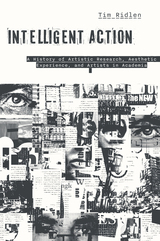
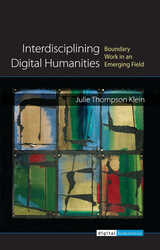
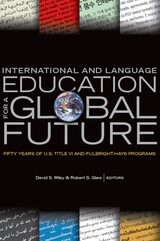
The contributions to this book address the role that the U.S. Department of Education Title VI and Fulbright-Hays programs have played in building the largest and highest quality infrastructure in the world for training in languages and other aspects of foreign area knowledge. The volume celebrates the 50th anniversary of the Title VI and associated Fulbright-Hays programs, which have established more than 150 centers of excellence for modern foreign language and area studies and international business education in more than 60 U.S. universities.
The authors review the history of the programs, including their founding and their cumulative impacts on internationalizing the American university at the graduate and undergraduate levels. They review how programs for foreign research, technology for foreign information access, and undergraduate programs have built the foundations of U.S. language-learning materials for use in college courses and government with improved language-learning pedagogies, erected the most distinguished library holdings on foreign countries, supported in-depth research abroad in virtually every nation, and created capacity to teach more than 200 less commonly taught languages.
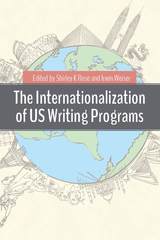
The Internationalization of US Writing Programs illuminates the role writing programs and WPAs play in defining goals, curriculum, placement, assessment, faculty development, and instruction for international student populations. The volume offers multiple theoretical approaches to the work of writing programs and illustrates a wide range of well-planned writing program–based empirical research projects.
As of 2016, over 425,000 international students were enrolled as undergraduates in US colleges and universities, part of a decade-long trend of increasing numbers of international students coming to the United States for both undergraduate and graduate degrees. Writing program administrators and writing teachers across the country are beginning to recognize this changing demographic as a useful catalyst for change in writing programs, which are tasked with preparing all students, regardless of initial level of English proficiency, for academic and professional writing.
The Internationalization of US Writing Programs is the first collection to focus specifically on this crucial aspect of the roles and responsibilities of WPAs, who are leading efforts to provide all students on their campuses, regardless of nationality or first language, with competencies in writing that will serve them in the academy and beyond.
Contributors: Jonathan Benda, Michael Dedek, Christiane Donahue, Chris W. Gallagher, Kristi Girdharry, Tarez Samra Graban, Jennifer E. Haan, Paula Harrington, Yu-Kyung Kang, Neal Lerner, David S. Martins, Paul Kei Matsuda, Heidi A. McKee, Libby Miles, Susan Miller-Cochran, Matt Noonan, Katherine Daily O’Meara, Carolina Pelaez-Morales, Stacey Sheriff, Gail Shuck, Christine M. Tardy, Stanley Van Horn, Daniel Wilber, Margaret Willard-Traub
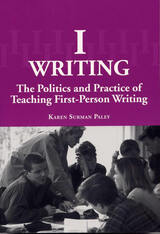
In this ethnographic study of the teaching of writing, Karen Surman Paley reveals the social significance of first-person writing and the limitations of a popular taxonomy of composition studies. Paley looks critically at the way social constructionists have created an “Other” in the field of composition studies and named it “expressivist.”
Paley demonstrates the complexity of approaches to teaching writing through an ethnographic study of two composition faculty at Boston College, a programthat some would say is “expressivist.” She prompts her colleagues to consider how family experiences shape the way students feel about and treat people of races, religions, genders, and sexual preferences other than their own. Finally, she suggests to the field of composition that practitioners spend less time shoring up taxonomies of the field and more time sharing pedagogies.
READERS
Browse our collection.
PUBLISHERS
See BiblioVault's publisher services.
STUDENT SERVICES
Files for college accessibility offices.
UChicago Accessibility Resources
home | accessibility | search | about | contact us
BiblioVault ® 2001 - 2024
The University of Chicago Press









